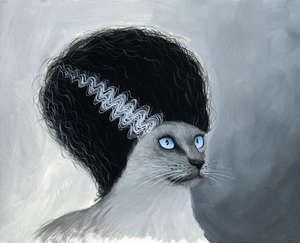Most English-speaking people will automatically think of a bride in white. Why?
It's a relatively recent idea - Victorian largely. It has to be said that most of the brides in Jane Austen's books time would have worn white too - but middle and upper class young ladies wore white most of time then.
Indeed, before the Victorians, many brides just wore their best dress, perhaps given a make-over with the addition of tinsel, lace or ribbons.
It was Queen Victoria's own dress that started the trend - and that played on the idea of white for purity. In Ancient Rome, the Vestal Virgins (priestesses of the goddess Vesta) wore white. This symbolism was adopted by the new religion - Christianity.
In medieval legend, the fierce white unicorn could only be tamed by a virgin.
Many monks wore white to show they were pure in heart: the Carthusians, Premonstratensians, Mercedarians & Paulines. Children and unmarried women have often buried in white coffins to indicate their innocence. In St Oswald's Church, Flamborough, they have a pair of white paper gloves* last carried as was the custom at the funeral of a Miss Major in 1761.
Interestingly, many cultures see white as the colour of mourning. Shinto brides in Japan wear a white kimono to show they have died to their own family.
And to fit with my story, the shrouds that dead bodies used to be wrapped in, were of course, white.
*There are white paper maiden garlands - but these are so interesting, they deserve a separate post.
Supernatural postings from K. M. Lockwood - all things eerie that feed my writing.
Tuesday, 26 February 2013
A whiter shade of pale
Labels:
customs,
dress,
gowns,
mourning,
symbols,
traditions,
weddings,
white,
white wedding
Thursday, 21 February 2013
The Bride of Frankenstein
We all know, of course that really it's the inventor who is Frankenstein in Mary Shelley's original tale.
But somehow the name has stuck to the creature - and to his bride-to-be. Interestingly in James Whale's 1935 film Elsa Lanchester plays both Mary Shelley here:
and the nameless Bride here:
 |
| 'Frankenstein or The Modern Prometheus' was written when she was 19 |
and the nameless Bride here:
Few images, and particularly hairstyles, can have had as much influence as hers created by Jack Pierce. Said to be inspired by the head of Nefertiti, it has gone to appear in all sorts of guises.
Photographer Flood has made herself into a Bride of Frankenstein:
Tommaso Jacobus has made this graphic:
I think it may have influenced the creation of Lily Munster:
And the following dolls have more than a touch of old Hollywood:
But a cat? Well, that's certainly recognisable.
In each case, it's interesting how this frankly unnerving bride has a kind of chilling elegance.
Labels:
bride,
eerie,
Frankenstein,
supernatural,
weddings,
weird
Tuesday, 12 February 2013
Left in the Lurch
The jilted bride - what a poignant idea that is! Filled with hope and joy for months, then having every expectation crushed at the last moment. No wonder we sympathise with the crazed Miss Havisham.
She may have been based on a real person: Eliza Emily Donnithorne (1826–1886) of Australia. Here's her grave:
Fortunately Miss Li was saved by Guo Zhongfan, a local community officer. She tried to kill herself after her fiancé had left her and married another woman just days before their wedding.
Taking quite a different approach was Angela Burrow, previously a Major in the Queen Alexandra’s Royal Army Nursing Corps. She went ahead with the reception on New Year's Day at Tylney Hall, staging it as a 'new beginnings party', after her fiancé of three and half years told her by text it was off.
Some might want revenge. Quentin Tarantino's The Bride in Kill Bill, for example, or this ghostly creation by Giulia:
Here's Cate Simmons' beautifully eerie take on Miss Havisham*
The writer Ronald Frame was so intrigued by Charles Dickens' jilted bride he wrote an entire backstory for her from the details in Great Expectations.
Another famous literary disappointed bride is Jane Eyre. Mr Rochester is denounced as a bigamist at the altar. Still married to his mad wife Bertha, he cannot wed the distraught Jane.
In real life, the pain of such a loss can lead to suicide attempts.
Miss Li seen seven storeys up c/o NBC news
Fortunately Miss Li was saved by Guo Zhongfan, a local community officer. She tried to kill herself after her fiancé had left her and married another woman just days before their wedding.
Taking quite a different approach was Angela Burrow, previously a Major in the Queen Alexandra’s Royal Army Nursing Corps. She went ahead with the reception on New Year's Day at Tylney Hall, staging it as a 'new beginnings party', after her fiancé of three and half years told her by text it was off.
Some might want revenge. Quentin Tarantino's The Bride in Kill Bill, for example, or this ghostly creation by Giulia:
How would you feel?
*For more delicate artwork, see Cate Simmons Steering for North
Tuesday, 5 February 2013
Window shopping
When I was little, I used to love staring into bridal shop windows.
I used to beg and plead for my father to slow the car down outside the grandest ones in Leeds.
My younger self saw only glamour and beauty.
Now I see an impossible ideal: a fake purity.
The visions in white I used to see have taken on another aura.
One I find quite disturbing.
How about you?
I used to beg and plead for my father to slow the car down outside the grandest ones in Leeds.
My younger self saw only glamour and beauty.
Now I see an impossible ideal: a fake purity.
The visions in white I used to see have taken on another aura.
One I find quite disturbing.
How about you?
Labels:
bride,
brides,
mannequins,
The Wedding Ghost,
vintage
Subscribe to:
Comments (Atom)


























.jpg)
.jpg)



